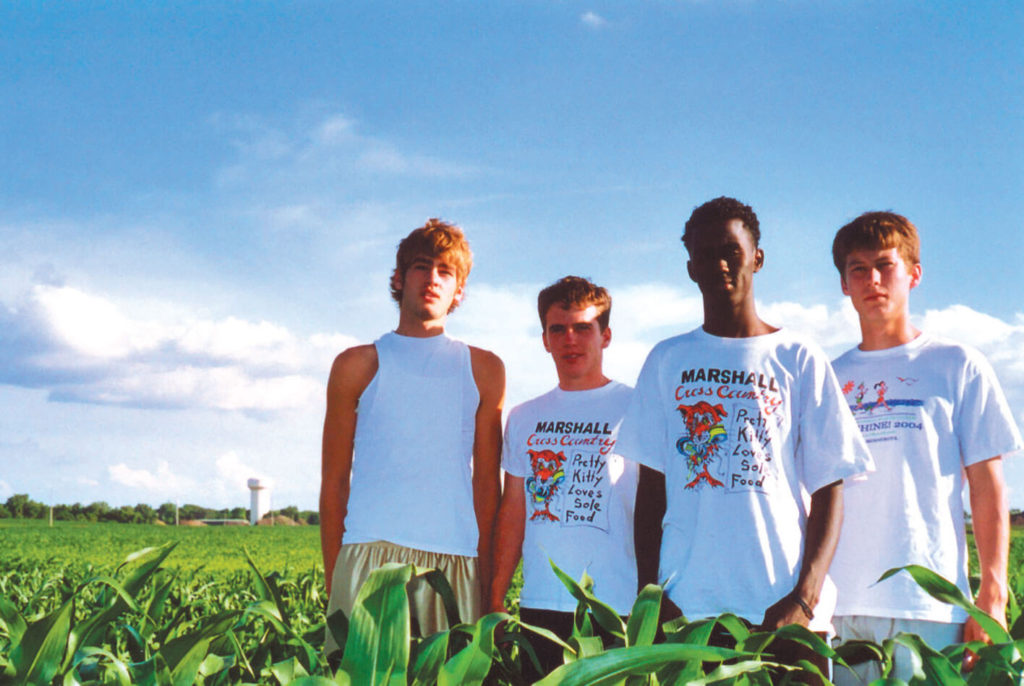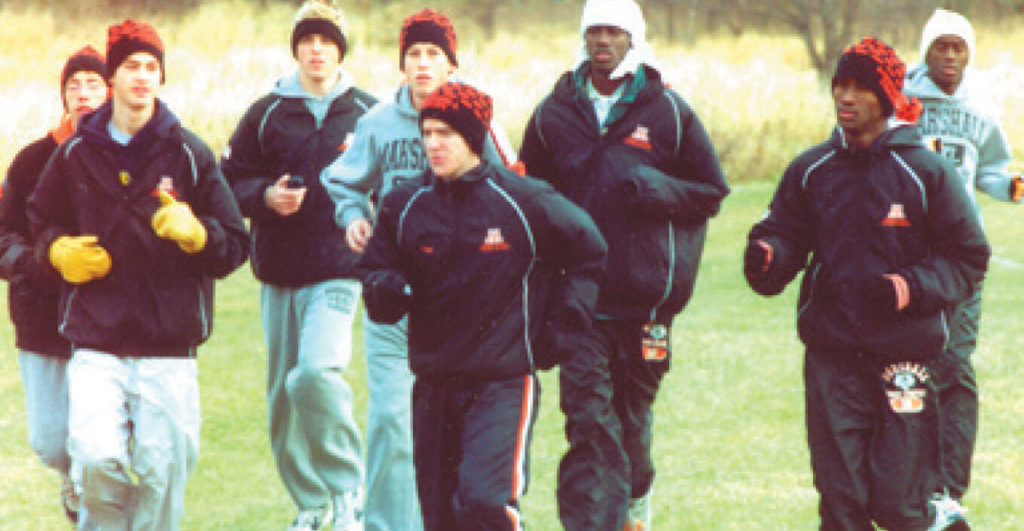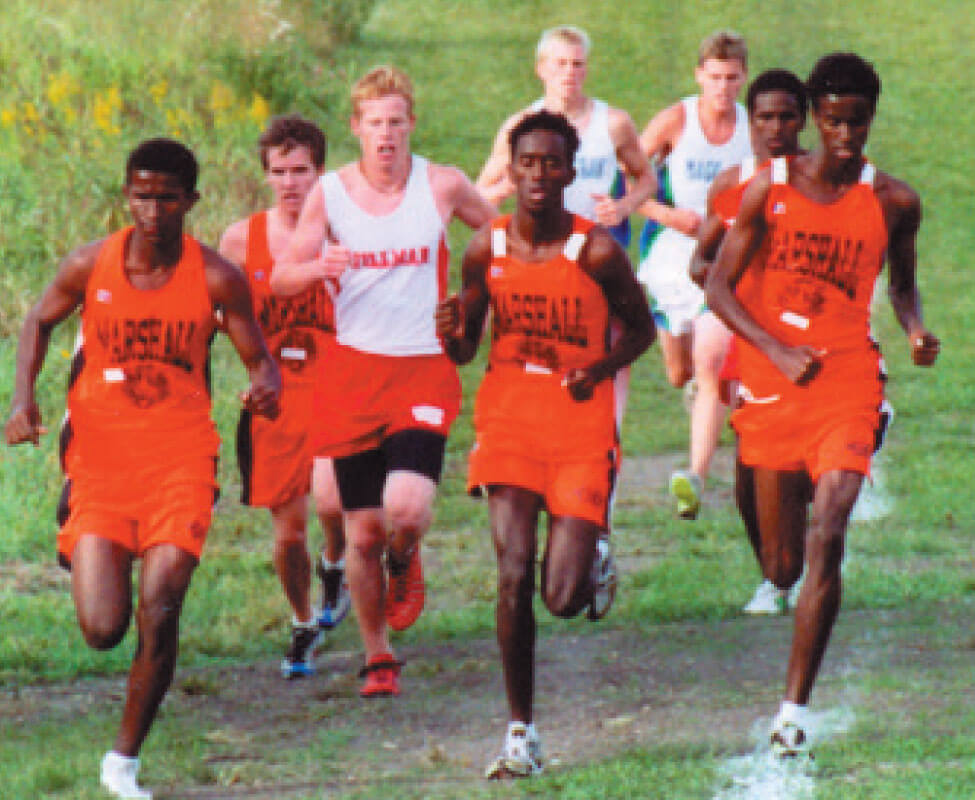by Drew Geraets

Nine-year-old Amendnur “Akey” Jumale had never seen snow before moving to Marshall, Minnesota. In fact, many things in the rural town of 13,000 were very different from his native Somalia. Getting up at dawn and heading to school replaced mornings spent praying at the mosque. Evenings of homework took the place of twilight soccer games, and sprawling cornfields took the place of sandy coastline.
“I didn’t even speak English,” says Akey. “They put me in a class of all white people speaking English. I was shaking.” But that challenge was small compared to life in Somalia. “It was dangerous there,” Akey recalls. “Fifteen-year-olds carried guns.”
Akey’s father was determined to give his family a new life in a new country. He saw Marshall as a peaceful place to work and educate his children. They arrived just as several other Somali families began trickling into town to work at a turkey plant.
The new Somali families splashed pallid neighborhoods with color. Women clad in vibrant dresses and head shawls drew curious looks as they walked to the grocery store. Giggling Somali children ran barefoot through a city park.
“The first year I was in Marshall it was very much a white school with very few spatters of color,” says Wade McKittrick, principal at the high school. “The last three or four years we’re really starting to see other ethnic groups.” Some communities struggle with such changes.
In another Minnesota town, white teenagers chased down a 12-year-old Somali boy with baseball bats and knocked out several of his teeth. A 64-year-old Somali man and 13-year-old Somali boy were also beaten in other racially motivated incidents. In another small town vandals scrawled hate graffiti on buildings owned and used by the Somali community.
In Marshall, a group of white students shouted racial slurs and threatened violence at Akey and a friend as they were driving. The two called police and filed a report. While rumors circulated, violence never materialized. Still, a sense of uneasiness hung in the air.
Art teacher Mike Jacobs remembers “A lot of people were wondering, ‘What’s going on?’” Jacobs soon learned just what the changes would mean to him as head cross-country coach at Marshall Senior High.
Akey and his older brother, Hussein, ventured down to the art room in the red-brick high school, ducking under mobiles and maneuvering around sculptures. They said they were interested in running for the team. Jacobs eyed the brothers. They looked every bit as lanky as the corn stalks surrounding the town — a perfect build for distance running. Later, Jacobs learned their father was once an Olympic marathoner. But, how would other students welcome these new teammates?
Sophomore Bart Johnson and freshman Tom Allen quickly bonded with the Jumale brothers. Tom made wake-up calls to Akey and Hussein for Saturday morning practice and Bart swung by their apartment to provide transportation. Akey spent so much time in Bart’s car he began to call it “our car.” The relationship extended to the school halls and weekend bonfires. “They’re my friends and I want to see them succeed,” Bart says. “So, I do whatever I can to help them.”

Succeed they did. The Marshall Tigers track team made their first-ever appearance at the state meet and finished 11th. Although Hussein left high school the following year, the number of immigrant runners continued to increase. Akey quickly evolved into the team’s unofficial recruiter, bringing in neighbors and friends to run with Tom, Bart, and the rest of the group.
Yahya Iman, a compactly built runner from Uganda, joined the track team as a freshman. He steadily improved, promising to come out for cross country the following fall. Three months later in his first meet Yahya was the Tigers’ top finisher and placed second overall. The team once again made it to the state meet; this time, the Tigers finished second.
By now Bart, Tom, and blonde farm kid Jon Tauer were familiar faces and mini-celebrities to many young Somali students in the halls. Jon thinks his friendship with runners like the Jumale brothers helped break down some of the barriers separating the two cultures at school. The boys continued to work together in practice and welcomed Akey’s younger brother, Dahir, into their running family. Dahir, then a soft-spoken ninth-grader, finished third overall in his first meet, trailing only teammates Yahya and Tom.
In their third year together, the boys soon found their team in the national rankings. Assistant coach Julie Keucker crisscrossed golf courses, shouting words of encouragement in Somali. Her new language skills were her attempt to embrace a new culture.
The runners’ families spread the effort as the squad qualified for yet another state meet.
Tom’s mom, Julie Allen, asked Yahya to invite his mother to make some of their traditional foods for the team’s final meal. Yahya’s mother, Mano Duxull, readily agreed.
“When I came to the door and introduced myself, Mano was so excited to have me!” Julie recalls. The food was a hit with the team as the boys passed over American cuisine and dug into dishes that included goat meat. As the runners ate, Julie observed the strong bonds among them. “Tom played basketball until ninth grade, and the team never had the family closeness I see here,” she says.
One evening Tom and his mother came to teammate Salah Mohamed’s wedding reception, a nightlong event that started at midnight. Tom saw friends and hopped out of the car to join them. Alone and feeling out of place, Julie sat nervously in her car.
“Pretty soon Hussein came and said I needed to come,” Julie recalls. “I said no, that I wouldn’t know anybody.”
Then, another man approached and invited her inside. “I said no and he said, ‘Yeah, you come with the mamas,’” she says with a laugh. Julie watched the women dance and chant, gaining a new appreciation for her Somali neighbors.
Following an all-school pep-rally, the Tigers headed to their third-straight state meet. Running with grit and determination, the Tiger runners in blaze-orange uniforms charged out at the start and quickly established position at the front of the pack.
Yahya dueled the defending state champion and finished just seconds behind him. Both runners broke the 18-year-old record. The crowd turned to see who would emerge next over the hill: it was a string of orange. Somali and American parents cheered together as news of the final scores spread. The Tigers had achieved their dream: a state championship.
“It was a dream season,” Coach Jacobs says.
Tom’s Irish heritage and Akey’s Somali roots cooperatively led to a state championship and showed the rest of the community and state how two different cultures could work together to reach a common goal. By chasing their running dreams, the boys created friendships that bridged any surface differences. “St. Patrick’s Day and Ramadan are now big holidays for the cross country team,” Tom jokes.


